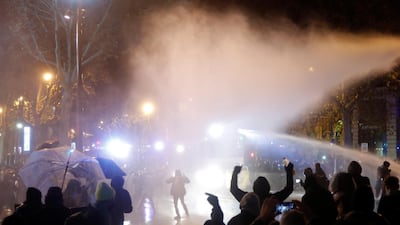A French court has blocked a controversial proposal to restrict the filming of police officers.
The measure, which triggered massive protests when it was unveiled last year, was part of a security bill spearheaded by President Emmanuel Macron's ruling party.
It envisaged five-year prison terms and fines of up to $90,000 for those who caused police officers to be identified during operations.
France's Constitutional Council ruled on Thursday that the text of the proposal was too vague.
It said the bill failed to specify whether the ban related only to live operations or also to past ones, and did not make clear what constituted a police operation.
The council said it was unclear whether any malevolent intent to identify officers was grounds for prosecution in itself.
"The Constitutional Council concluded therefore that the legislative body did not sufficiently define the elements that constitute the offence in question", it said.
In response, Interior Minister Gerald Darmanin said he would seek "to improve the provisions that were the subject of reservations by the Constitutional Council".
Christophe Deloire, the head of press freedom group Reporters Without Borders (RSF), said on Twitter: "This is very good news for the ability of journalists to cover protests."
Critics say the measure would make it difficult for journalists and citizens to document cases of police brutality.

Tens of thousands of protesters marched in Paris in November to denounce the original wording of the provision.
Footage of white police beating up an unarmed black music producer in his Paris studio in November amplified anger over the legislation.
Other incidents caught on camera include police in Paris violently tearing down a migrant camp.
The measure was rewritten in the wake of the protests but was still in the security bill as passed by parliament on April 15.
But it was struck down by the Constitutional Council which also took issue with other parts of the bill.
The council ensures that laws passed by parliament are compatible with the French constitution, and is often asked for its opinion on civil liberties questions.
Mr Macron's government argues that the law is needed because police officers have become targets of attacks and calls for violence against them on social media.
Thousands of French police officers rallied in Paris on Wednesday demanding better protection and harsher punishment for attacks against them.
Police unions had called for the demonstration after officer Eric Masson was shot dead earlier this month.
The shooting occurred while he was investigating activity at a known drug-dealing site in the southern city of Avignon.
The killing reignited the debate over Mr Macron's record on fighting crime in the run-up to next year's presidential election.


